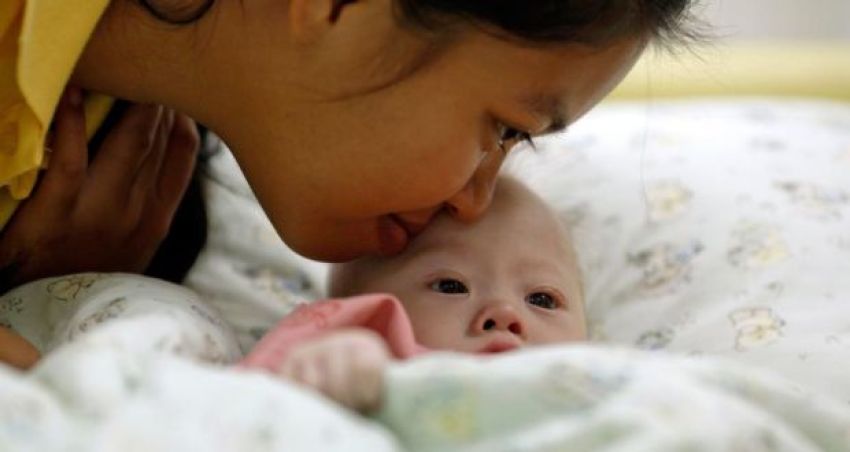States consider bills to ban abortion based on Down syndrome: 'Dignity they deserve'

Lawmakers in Pennsylvania, South Dakota and Arizona are considering bills to ban all abortions based solely on prenatal Down syndrome diagnosis, similar to legislation passed in other states.
Introduced earlier this year, Pennsylvania’s Senate Bill 21, which would ban abortions based on Down syndrome diagnoses and sex of the child, was introduced and co-sponsored by 16 Republicans. In Arizona, lawmakers are advancing Senate Bill 1457, which would ban medical providers from providing abortions when a fetus has a genetic abnormality such as Down syndrome.
Meanwhile, South Dakota Republican Gov. Kristi Noem introduced a similar bill in the Mount Rushmore State.
“The Declaration of Independence summarizes what we all know in our hearts to be true: God created each of us and endowed all of us with the right to life,” Noem said in a statement. “This is true for everyone, including those with an extra chromosome.”
In recent years, multiple statehouses have passed legislation to ban abortion based on a Down syndrome diagnosis.
Ingrid Duran, National Right to Life Committee director of state legislation, told The Christian Post in an email that these pieces of legislation protect Down syndrome babies from being discriminated against.
“Eugenics in abortion is real and must be prevented,” Duran wrote. “These laws are so important to protect unborn children from this type of discrimination in the womb.”
Last month, South Dakota legislators heard testimony from supporters of the bill, including pro-life and Down syndrome advocates. And in Arizona, a Republican-majority Senate panel approved SB 1457 in early February. According to NBC News, advocates on both sides believe the measure will go before the Senate floor and is expected to pass.
In Pennsylvania, legislators passed a similar bill in 2019. However, Democratic Gov. Tom Wolf vetoed the pro-life legislation, according to the Associated Press.
Tennessee passed a bill last July allowing the state to enforce abortion “reason bans” based on a Down syndrome diagnosis or the race and sex of the child. The law was upheld by the Sixth U.S. Circuit Court of Appeals in a ruling last November.
Mississippi also enacted legislation last year banning abortion for the reasons of race, sex or a genetic abnormality such as Down syndrome. In 2017, Ohio passed legislation making it illegal for doctors to perform abortion solely because of a Down syndrome diagnosis. The legislation was later blocked by a divided Sixth Circuit panel.
“Passing these laws demonstrates the compassion our society should have towards the vulnerable and that the humanity of these preborn babies or anyone with any disability or potential disability is worthy of protection,” Duran wrote.
Abortion-rights proponents have spoken out against such bills over the years, claiming they violate women's ability to make decisions about abortion with their doctors.
In 2014, Pennsylvania passed the Down Syndrome Prenatal Education Act, or “Chloe’s Law,” which requires healthcare providers to provide information to women who receive a prenatal Down syndrome diagnosis,according to The Pittsburgh Post-Gazette.
Named for Chloe Kondrich, a girl with Down syndrome, the bill’s efforts were spearheaded by her father to give families hope and make them aware of resources to steer them away from abortion.

In 2017, 18% of all pregnancies in the U.S., excluding miscarriages, led to abortion, according to Guttmacher Institute. The rate is higher for pregnancies with a prenatal Down syndrome diagnosis, though the percentage is not certain.
In countries like Great Britain, Germany and Denmark, studies show over 90% of babies born with Down syndrome are aborted, according to the Life Institute, an Ireland-based pro-life organization.
In Iceland, it was reported that virtually all babies with Down syndrome are aborted.
Dr. James Dobson, Christian psychologist and founder of Focus on the Family, commented in 2017 on a CBS report regarding Iceland’s Down syndrome abortion rates and said, “a child born with a chromosome defect is a child made in God's image, fully capable of living a happy, productive and healthy life.”
"I have rarely seen a story that so closely resembles Nazi-era eugenics as a recent report about Iceland 'eradicating' nearly 100 percent of Down syndrome births through abortion," Dobson said. "This is a trend closely followed by other Western nations including Denmark, France and even the United States. We should all be deeply sorrowful and outraged."
Down syndrome is the most prevalent chromosomal condition and occurs when an individual has an extra copy of chromosome 21. It affects about one in every 700 babies born in the United States, and around 6,000 babies with Down syndrome are born in the U.S. every year, according to the National Down Syndrome Society.
“We [as a society] are slowly starting to treat people with disabilities with the respect and dignity that they deserve,” Duran wrote. “We are starting to see more representation in the media of persons with Down syndrome and autism — even in mainstream media like ‘Atypical’ on Netflix, ‘Parenthood,’ and ‘Life Goes On.’ Having adequate representation shows that these individuals — with love and support — can and do lead full, productive, and enriching lives. They bring joy to their loved ones.”



























